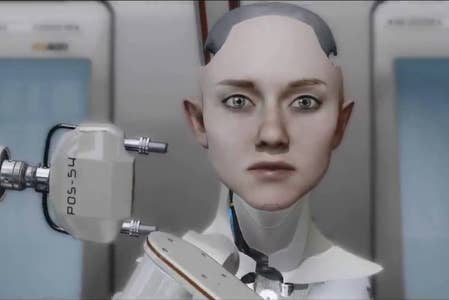Safe Words: Cage, Kara and Quantic Dream
David Cage on adult story-telling, playing with emotions and why he won't work on Heavy Rain 2
If you want a lesson in how to impress at GDC, you should probably take notes from David Cage. The Quantic Dream founder managed to win over the crowd with nothing more than a five minute prototype video showing an android begging for her life.
In his exclusive chat with GamesIndustry International Cage spoke about Kara, about the need for more meaningful games, and why sometimes he wishes he could just be the kind of guy who would make Heavy Rain 2.
That's a good question. I don't know if it's a question for me because I'm doing it; it's rather a question for all the people out there. But a part of the reason probably that it's more interesting to do first person shooters is because you have a chance to sell 25 million or so units of your game because Call Of Duty showed it was possible with this genre. With Heavy Rain we just showed we could sell 2 million units. Which is a lot, but far from more popular genres.
We make games for kids and teenagers. We totally ignore adults out there
And this is something really difficult to do to be honest, and it takes time and it takes a publisher to trust you - to give you funding, and to give you the time. And you need to find an idea and you need to spend two years travelling through the world convincing everyone that this is worth doing and worth giving a chance. So it's not easy to do.
Of course. We make games - I keep saying this and this is not a very popular to be honest, but I'm not trying to be popular - I think we make games for kids and teenagers. And I think we totally ignore adults out there. Yes there are adults playing Call Of Duty and playing other games from time to time, and that's fine. But you find less and less people as they get older keep playing, just because they lose interest. Because when you fight zombies or monsters, that's fine.
It's funny when you're ten, twelve, fifteen, twenty but then when you're in your thirties and you've got a wife and a job and kids and your tastes have changed, this is not what you're looking for anymore. You want more meaningful things in your entertainment, and this is what we try to provide and we try to create. I think the industry is entirely focused on certain genres and certain demographics, and I just hope one day they will consider seriously making games for a more mature audience.
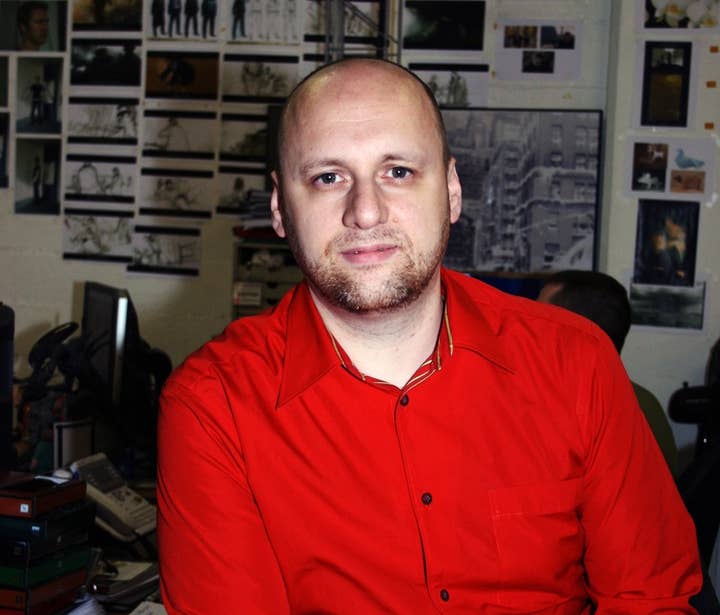
I totally agree. It's all about how you consider games. If you just think that they are toys that you can play with and have fun and that's it, and you close the box and forget about it, that's one thing. But then you could also consider games like movies or literature; something that is more meaningful to you, that is more emotionally engaging, something that can leave an imprint in you and change maybe how you see the world, how you see things, who you are in a certain way. Like the best movies you've seen left an imprint in you and changed you in a way. And games could be used to do this.
I mean, there is no reason why we couldn't do it; it's a very powerful medium, incredibly powerful. Unlike movies, it's not something that's passive, it's something that actually you're a part of it, you're in the shoes of the hero, you can make your decision, you can see the consequences. It's really funny for me to talk to people who played Heavy Rain because some of them took that very seriously and very emotionally, and they were very nervous when they had to decide if they wanted to cut their finger or if they would kill the man or not, and all these difficult decisions. This is the part I'm most proud of with Heavy Rain; it resonated with this audience in a very unique way.
It's more interesting to do first person shooters because you have a chance to sell 25 million units. With Heavy Rain we just showed we could sell 2 million units. Which is a lot, but far from more popular genres
Why not? It happens right now. I was really glad to be contacted every month by students, calling about my work. That's great. I'm really proud of that. Now, do I deserve that? It's another question, but it's an honour. But of course you can say major things about life and the world, and you can share your vision the same way in the game as you would in a book or film. It's just at the moment games are still considered like toys, so you should have very light themes. They should not be about politics or human beings and tricky human situations. It should be about killing the enemies. But we see this changing.
With Heavy Rain, we made with Sony a game about child abduction and the relationship between a father and his son. That's a very serious matter; it's not exactly a video game typical theme, and the game was reasonably successful. So it seems that there is a space for this type of game. There is a part of the audience that has an interest in seeing different games. It's still not the same market share as Call of Duty, for sure, but it's a start.
Also, it's about demographics when you think about it. I'm 42, I play less and less. I've been playing since I was 10. Like many people my age, I have difficulties finding games that I really enjoy, because I've played them in the past in one way or another. How many games is there that really talk to adults, with adult themes and adult art direction? Very few. So I hope that there is a share of this market and audience that we can talk to with Quantic Dream.
Oh yes. I mean you don't need to have this engine and a motion-capture stage to create emotion in a game. You can create emotions with cubes if you're capable of animating them and telling something great with it. You don't even need a story; you can have emotion without the context of a story, so there are many different things you can do. Technology is just a tool that you use to write the book, but it's not the book in itself. So you can have different qualities of pens, different colours, but what matters is what you do with the pen, what you write, and you can write different things with different inks.
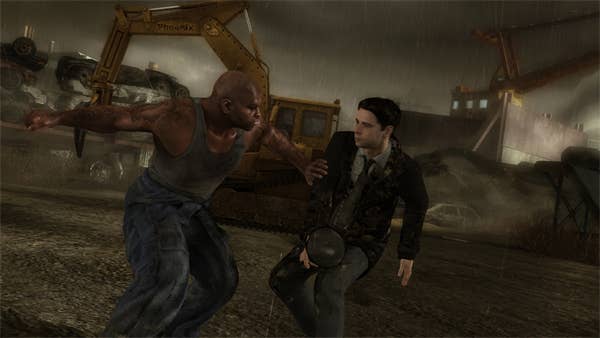
Sony was important as a partner to give us the time and means to do what we do. And very few publishers would have done it. They trusted us with Heavy Rain, they gave us time and money to do this Kara demo, where we have nothing to sell - it's just, 'here it is, it's for free.' They are incredibly valuable as a partner in this context.
From a technical point of view, no, we're pretty much autonomous. So everything is really developed internally. But it was great, for example, when we started working in PlayStation 3, we got alpha kits to develop on PlayStation 3 maybe earlier than other developers just because of the relationship that we had. So it allows you to start earlier in the cycles because you have access to prototypes and to different hardware.
I'm much more interested in what happens in your mind than what happens with your hands. I mean, I've never been a big fan of the thumb's interactions with pushing a button as quickly as possible. We did it very simply in the quick-time events in Heavy Rain and you could adjust the difficulty level to make it very simple if that's what you wanted. I'm more interested in the journey than in the challenge. I think what matters is what you live and what you feel. It's not having a monster that is so difficult to kill that you need the whole night to beat him until you can go to the next level when you can fight a monster that is even more difficult than the first one. I'm too old for that.
I mean, there is an audience for that, and there are games doing this very well, and that's fine with me. But that's not the kind of experience that I enjoy personally, and I know when you get older you don't have enough time for that. What matters is what you feel. It's not the amount of frustration, it's not the challenge, it's not the fact that you can announce to your friends that you beat this goddamned boss. You're friends probably don't give a shit. I mean, do you see yourself going, 'Hey, I beat this boss and I made so many points?'
We've spent a lot of time in Hollywood for the last five years or so for different reasons. They understand the technology. Five years ago no one would have wanted to talk to you in Hollywood
Oh yeah. We've spent a lot of time in Hollywood for the last five years or so for different reasons. And since Heavy Rain was released their attitude has totally changed because before Heavy Rain - and not only Heavy Rain, but L.A. Noire and Avatar - in the CG respect, they understand the technology, it has changed a lot because five years ago no one would have wanted to talk to you in Hollywood just because I'm doing games.
When we talk to agents or to talents they check who we are and they read about Heavy Rain and it really opens doors to us.
Not interested in names, I'm interested in talent. Sometimes you have a big name because you have a big talent. Sometimes you just have a big name. Whoever has talent, whether it's someone famous or not famous is interesting to me.
Talented people are the only thing that matters. Being famous is not a guarantee of being talented. Sometimes there is a reason. 'You're famous because you're talented,' and in this case, this is interesting to us. But if you are just looking for a name, you are doing marketing. That's fine, but if you are looking for talent you are looking for the right actor for the right role. If this person is famous, even better. If not, it shouldn't be something that matters really.
I love when I find an actor who has naturally something that relates him to his character. Sometimes it's something in their personal life; sometimes it's something that I discover later on. With Pascal Langdale I discovered later on that he was trying to have a baby at the time he was shooting Heavy Rain, and he got one since then so congratulations! Maybe I felt something about this, about his relationship with the son, with the kid that he didn't have yet, and I think he would bring that on stage. And with Kara, I still don't know why she is Kara, but I know that she has something of this character naturally. When you saw the audition she is Kara. She came in and I said, 'Whoa, there she is.'
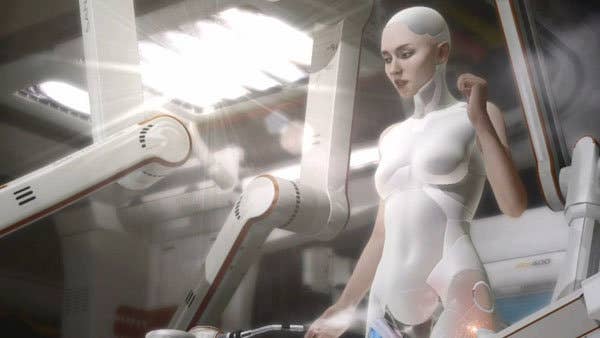
It's amazing, and I'm a very lazy director; it's always easier when I find an actor who is natural in my character than starting with someone who is so different and trying to work very hard to get him to become what I want them to be.
So that's the quality I'm looking for, and I'm also looking for respect for the medium. I hate people coming because they want to make money and they don't care about what you're doing. They don't care about the script, [it's] just because they can make some cash. I try to avoid as much as possible these people. Or who think, 'Oh, I'm between two films but I'm okay to get some cash quickly doing some video games because I'm a talent.' Hate that. Hate that. We stopped working with some very famous people in the past just because we felt that they didn't respect the medium.
No, and there was some misunderstanding in the past with some people because they came and said, 'Oh, making a video game shouldn't be that hard'. And actually when they came they realised that we were more demanding or as demanding as directors on a film stage. It's not because it's a game you can deliver a poor performance and no one cares, it's just for kids anyway. I mean, I don't buy that.
We are more demanding and in matter of volumes some of the actors were really surprised. Sam Douglas, he was Scott Shelby in Heavy Rain, he made movies, he worked with Stanley Kubrick and Luc Besson and different people and he was amazed. He told me at the end of Heavy Rain, 'My god, this was like three or four movies' in the matter of volumes. He was so surprised. That's usually the feedback we have, so we like hard-working actors respecting the medium and bringing their talent to the stage.
It really depends on how games are going to evolve in the future. We want games to become more meaningful. At the same time, we are alone to say that, pretty much. Most of the industry is about action, adrenaline, stress and fun. So they don't need Hollywood; Hollywood doesn't need them. So I don't think they will get closer in the future if the industry continues to evolve in this direction. Now, with what we do, they are other people doing it better, doing it in different ways - I think there are really links to create between both industries, And I think it will be something interesting for both, because I think the film industry also has things to learn from the game industry.
We stopped working with some very famous people in the past just because we felt that they didn't respect the medium
They use a lot of IPs coming from comic books, and that's great, but I think at the same time, in the games industry, there are some interesting IPs that could become very interesting films. So maybe we have a lot to share and to learn from each other, and this is going to happen in the near future.
Definitely. I mean, we all do pretty much the same things, we all display polygons and we all do the same things in a certain way. But there is no format; there is no standard yet emerging from all this technology where everybody could agree, 'Okay, this is the technology,' like they have in films. In film no one cares what was the brand of camera that filmed the movie - very few people care. What you care about is what they've done with the camera, with the film. Was it a good movie or not? I hope one day we'll reach this stage where there will be a shared technology that will be pretty much everything you wanted to do and the result will only depend on how you use this technology - what you have to say to the world using it.
I think we will reach a point where everybody will realise we're doing the same thing the same way, so why are you doing it again? If you see what I mean. And that the money that you spend there could be spent somewhere else, and it will make more sense to invest in creative talents rather than investing in more programmers in your team.
So we're not there yet because it's still a factor of competition: if you're engine is slightly better, if you have features that others don't have yet it's an advantage for you, but there will be a point where everyone will have the same set of features.
I don't feel like we're in a competition for who's the best. I don't care. L.A. Noire did a fantastic job in what they did. But I think the limitation that we had and what we had with Heavy Rain is that they couldn't shoot the body at the same time. So all the body language, all the sync between what you say and how your body moves is lost. And I think that's a big loss. Our main goal was to re-establish this; the consistency of this performance. That was our main goal. This is what we are trying to demonstrate here.
The last prototypes that we made, that are still confidential, are very spectacular in many ways because suddenly you realise how much we lost in the past not treating the body in the same way. So it's just that different people have different approaches and everything is fine, and it worked for them. It worked for us in Heavy Rain. This is really the direction we want to explore in the near future. This is what James Cameron is doing; this is what Steven Spielberg is doing in cinema. So they know what they do in this way. I think this is applicable now in games.
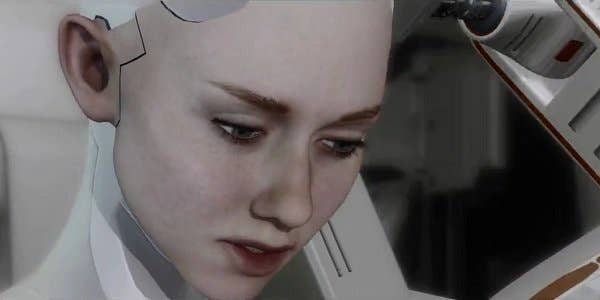
Much more, to be honest with you. One of the reasons why we didn't show this a year ago was that we had discussions with Sony, and they weren't sure that what we were going to show after that was going to look better than Kara. It took us a year to prove what we were going to show was a thousand times better than that. So we're very far from seeing everything the PS3 can do. It's very powerful hardware. People will be surprised.
That's difficult to answer. Developers use the hardware in different ways. We put the focus on very close shots and the lighting is very important to us. Other developers consider what matters [to be] the size of the landscape you can display. So different developers have different views of the hardware. Personally, I consider it takes two to three games on the same path to really see what you can do with the hardware. The teams discover the hardware, they start to use it. The more it goes, the more you can discover what you can do with it.
Honestly, the hardware? I don't really care. I know it's progressing every year and the PlayStation 4 will be better than the 3 and the 5 will be better than the 4. And at the end of the day it's just the amount of polygons you can display in one frame. So okay, it's more and more and more, that's great. It's not important, I think. What is great is that when we start to do it on Kara, we start to play with cinematography, with optics, with lenses, with diffraction, with lights, with artefacts of light and optics ad it really tells you something. It's really a way to play with image.
Instead of having something that is perfectly clean you have something that is not perfect. That makes the image more interesting. And we have developed a new depth-of-field, for example, so it's very interesting because we have developed bokke - "bokke" is a Japanese term to describe how the light reacts in the depth-of-field, and now we have very realistic systems where the light... describing it is horrible, but when you see it you say, 'Wow!' It's just really beautiful... and it's great you have more to play with and more ways to play with the image and use it to tell what you wanted to tell. So in that aspect technology is great, but it's not an end. It's not a goal by itself; it's just a mean.
The hardware? I don't really care. When we work on Kara, we start to play with cinematography, with optics, with lenses, with diffraction, with lights, with artefacts of light and it really tells you something. It's really a way to play with image
I think emotion. Emotion is the ultimate goal. And you can use the story to create emotion, but it's not required. There are other ways of creating emotion without a story. If you look at Flower, for example, there is not really a story; it's more of an emotional journey, and that's fine. It works very well. You don't need a story. It's the way we chose to create emotion, but there are other ways.
No. There's nothing, really nothing. Any emotion that can be created in a film can be created just as well if not better in a game. Just because instead of watching it you are really experiencing it yourself; because it's you, and you're interacting with the experience. But no, you can make people laugh, you can make them cry; it just depends on what you have and how you do it. Nothing is impossible.
I heard David Jaffe say that - we were in a panel together - and I was really surprised to hear that and was disappointed by it. If you asked for my opinion, the best part of God of War was the story. I mean, I really enjoyed the game when I saw the ending, and when I understood the background story of this character. Many people say the same thing. God of War was a great game by itself. It was incredibly visual and epic. What made it unique and different was storytelling and characterisation. It was really funny to me, because that was the best part of the game. Now in Heavy Rain, I disagree. Many people in this industry think that interacting should mean shooting at someone or destroying someone, or else it's not a game, it's not interacting.
I disagree with that. I mean, drinking orange juice, some people made jokes about that in Heavy Rain because it is one of the first actions you make in the game. It's interacting. It has the same value as shooting at zombies or monsters. It's just a different part; it's about role-play, it's about being in the shoes of the character, and it's about sharing his life, sharing what he feels, sharing what he does. So by the time something meaningful happens to him, you're with him. You feel emotionally involved in this character. So I disagree, I don't think the balance was wrong in Heavy Rain; I think the balance was different. Having a game where characters don't have a gun is not an issue. It's not an issue, and it shouldn't be an issue for anyone. It's time for the industry to start to think about other ways of interacting than shooting, killing and destroying.
Oh yeah, all the time. Heavy Rain was a huge risk. What we're doing now is a huge risk. We should be doing Heavy Rain 2. That would be a safe bet. So yeah, but taking risks is part of what we're doing. I mean either you want to be a pioneer, and there are risks to being a pioneer, or you just want to become rich and you'd better stay where you are, find some gold somewhere and build a city. That's not what we're doing. We found gold here and we want to know there is not more gold somewhere else. So that's how we see our work.
No, and sometimes I hate myself for not being like that. It would definitely make my life easier. It would definitely make me richer. But it would be boring.
James Brightman also contributed to this interview.
